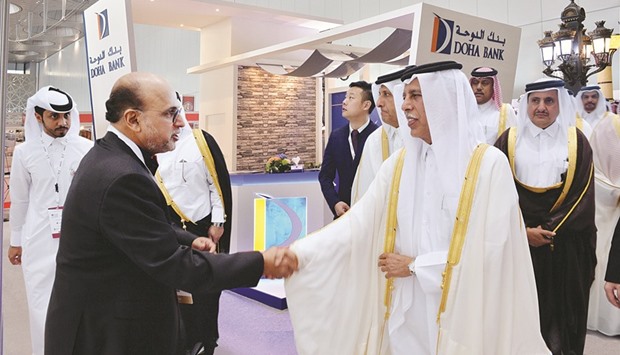Optimistic on enhanced strategic relationship between Qatar and China, Doha Bank has said the recently held ‘Made in China’ exhibition will offer an opportunity for Doha to tap into the Asian country’s technological advancements.
The Gulf Cooperation Council (GCC) countries mainly provide more than 50% of China’s energy needs, including petrochemical products and metal industries. Qatar has launched Renminbi Centre in Doha, an example of Qatar-China strategic relations. The International and Commercial Bank of China is the clearing entity for the Chinese currency deals in Qatar.
Doha Bank highlighted that in January 2012, China National Petroleum Corporation and its partners Qatar Petroleum and Royal Dutch Shell agreed to a $12.6bn refinery and petrochemical complex in east China. In May 2012, Petro China signed a pact to acquire 40% of exploration and production rights for Qatar’s Block 4 from GDF Suez Qatar.
In March 2011, Qatar signed an $879mn contract with China Harbor Engineering for the construction of the first phase of Qatar’s New Doha Port.
In January 2012, Mazaya Qatar Real Estate Development Company awarded China’s Sino hydro a contract worth $130mn to construct the Sidra Village project. Qatar’s sovereign wealth fund received permission in 2012 to invest in China’s capital markets.
Qatar Investment Authority holds shareholding in Agriculture bank of China. In August 2012, it bought a 22% stake in China’s CITIC Capital. Qatar holding also has a $1mn cap that a qualified foreign institutional investor can obtain in China, Doha Bank noted.
Elsewhere in the Gulf, Saudi Arabia-China trade has surged from more than $43bn in 2010 to more than $69bn in 2014, it said, adding Chinalco, China’s state-run aluminium manufacturer, is funding phosphate projects in northern Saudi Arabia. Saudi Aramco and Sinopec Group signed a deal to develop the 400,000bpd refinery ‘Yasref’ in January 2013.
The UAE-China trade has surged from more than $25bn in 2010 to more than $50bn in 2014. Chinese companies are operating within the logistics, aviation and energy sectors in the UAE. China and the UAE signed a $5.5bn currency swap deal in January 2012.
Kuwait-China trade had swelled from $8.5bn in 2010 to more than $13bn in 2014. In June 2014, Kuwait and China signed agreements and memoranda of understanding (MoU) to boost their ties and cooperation in the areas of economy, investment, energy, culture, education and civil aviation.
In January 2013, China’s foreign exchange regulator awarded Kuwait Investment Authority (KIA) fresh quota of $700mn for direct investment in the Chinese securities market, on top of the $300mn already granted earlier. KIA has stake in agriculture bank of China. KIA was also granted a $1bn licence by China’s central bank in 2012 to invest in its domestic interbank bond market.
Oman-China trade has risen from more than $10bn in 2010 to more than $25bn in 2014. China is one of the major importers of crude oil from Oman. Bahrain-China trade has surged from more than $1bn in 2010 to $3bn in 2014.
Business / Eco./Bus. News
‘Made in China’ exhibition will offer opportunities for Qatar in China: Doha Bank

Dr R Seetharaman, Group CEO of Doha Bank, with Deputy Premier HE Ahmed bin Abdullah bin Zaid al-Mahmoud at the recently held ‘Made in China’ exhibition.
